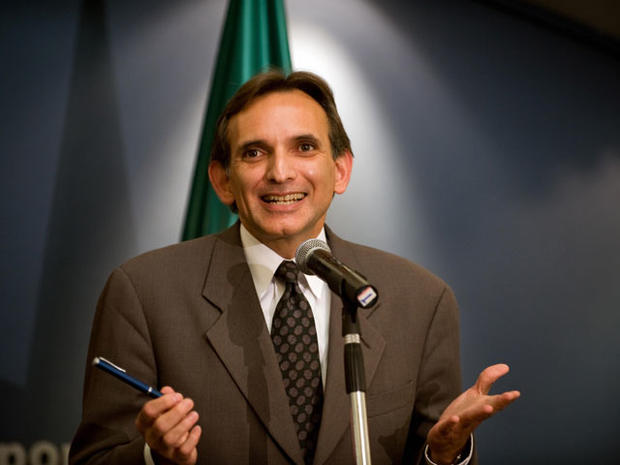US Ambassador to Mex. resigns after cable leak
(CBS/AP)WASHINGTON - After a heated campaign against him by Mexican President Felipe Calderon following an embarrassing WikiLeaks diplomatic cable release, the U.S. ambassador to Mexico has resigned.
Secretary of State Hillary Rodham Clinton, in Paris to meet with U.S. allies on Libya, released a statement Saturday announcing Carlos Pascual's departure.
Clinton said Pascual's decision was "based upon his personal desire to ensure the strong relationship between our two countries and to avert issues" raised by President Felipe Calderon.
Clinton didn't say specifically what she was referring to. But Calderon was quoted in a newspaper in February as taking umbrage at a cable that Pascual wrote questioning whether the various Mexican security agencies and military were properly coordinating efforts to control the drug problem there. His cable was divulged by the WikiLeaks website.
Pascual, a career diplomat for 23 years, had described Mexico's army as "risk adverse" in a diplomatic cable released by WikiLeaks. He had also claimed that Mexican officials did not follow on U.S. intelligence leads on drug cartels.
McClatchy Newspapers reports that, following the cable leak, at a March 3 meeting with President Barack Obama at the White House, Calderon said his level of trust in Pascual had fallen steeply.
Some speculate that Calderon's mistrust of Pascual ran deeper than the WikiLeaks flap.
McClathcy reports that Pascual fostered programs to lessen violence in Ciudad Juarez, a border city that suffered more than 3,100 homicides last year. News reports say Calderon is irked that since Pascual's arrival in Mexico in 2009, he traveled to Juarez more often than the president.
Additionally, Calderon may have been annoyed that Pascual was dating the daughter of one of the political party chiefs opposing the Mexican president, McClatchy reports.
Pascual's resignation appeared to be the biggest fallout yet from thousands of sensitive U.S. diplomatic cables from around the world released by WikiLeaks. It was the first such public departure by a U.S. ambassador during the Obama administration.
Clinton took the unusual step of announcing the departure of an individual member of the diplomatic corps, and while she was on the road meeting with U.S. allies to discuss the commencement of military attacks on Moammar Gadhafi's Libyan government.
She went to lengths to praise Pascual's work in Mexico and said the Obama administration never lost confidence in him. Clinton said Pascual's work with Mexico to build institutions capable of fighting drug traffickers "will serve both our nations for decades."
She added that she was "particularly grateful to Carlos for his efforts to sustain the morale and security of American personnel after tragic shootings in Mexico" that killed a U.S. employee and three other people tied to the consulate in Ciudad Juarez last year.
The ambassador's resignation, however, laid bare how difficult relations between the U.S. Embassy and the Mexican government had become since the release of the cable in December.
One of the leaked diplomatic cable that most angered Calderon was dated Jan. 29, 2010, and referred to friction between Mexico's army and navy while detailing an operation that led to the death of drug lord Arturo Beltran Leyva.
Pascual said the U.S., which had information locating Beltran Leyva, originally took it to the army, which refused to move quickly. Beltran Leyva was eventually brought down in a shootout with Mexican marines, which have since taken the lead in other operations against cartel capos.
Other U.S. Embassy cables released since have reported jealousies and a lack of coordination between various Mexican security forces.
Their release has marred a relationship that both the United States and Mexico have for years touted as being stronger than ever.
Washington supports Mexico's war against drug trafficking with more than $1 billion in equipment and training, and has frequently praised Calderon's government for bringing down an unprecedented number of top drug lords. Mexico, in turn, has extradited a record number of trafficking suspects to the U.S. for prosecution, a step Mexico was long reluctant to take.
But the Calderon government has become testy when U.S. officials express serious concern about the growing violence in Mexico, where more than 35,000 people have been killed in drug gang violence since Calderon launched a military offensive against cartels in 2006. Calderon publicly criticized Clinton last year when she suggested Mexico was starting to resemble Colombia two decades ago.
